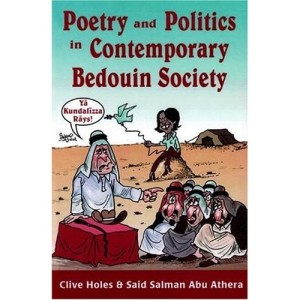|
Reviewed by: Elin Nicholson, Ph.D. Candidate, Centre for the Advanced Study of the Arab World (CASAW), University of Manchester This anthology of modern and recent Bedouin poetry, recorded and translated into English by the authors, provides unique and timely insights into the social and political motivations behind the composition of the traditional Nabati oral poem. By reflecting the current worldviews of today’s Bedouin in southern Jordan and the Sinai, it presents an excellent survey of forty-one works by five of the best-known Bedouin poets of this region. This volume captures the sardonic wit and acerbic perspective of the original poems beautifully, and the transliterated Arabic of the Bedouin dialect and its English translation enables it to be accessible to all interested readers. The introduction clearly explains the methods used for compilation and translation, and states the problems inherent in such a task. Although an Arabic script version of the poems is included, the difficulties of transferring colloquial Arabic, which does not follow the grammatical rules of its formal counterpart, into (written) Modern Standard Arabic, is acknowledged and accepted by the authors (p3). If anything, the transliterated Arabic version enables the reader to speak the poems out loud, thus more effectively capturing the intended rhythm and flow of the original spoken poem, and enhances, rather than detracts from the experience. Most of the featured poems, are based upon the conventional, medieval Islamo-Arabic “double-rhymed” Qasida poetry model, although variations on this are frequent (p40-1). In keeping with the traditional Nabati form, the poems center on a single motif, expressed through Arabic literary customs, such as the rihla or nasib (message), or dikr allah (address to God) (p11-13). However, these forms are experimented with, and updated, in order to resonate more clearly with the poets’ modern-day Bedouin audience. The poets are, in the authors’ opinions, proclaiming the “communal voice” of the Bedouin people through their verses, rebelling against their ill-treatment at the hands of the authority, and attempting to preserve their traditional way of life through a cultural medium (p10-11). The identifiable themes present within these poems focus on both international and national issues relevant to the Bedouin community, ranging from the numerous wars in the region in the second half of the twentieth century, to the impotence and nepotism of despotic Arab leaders, to the impoverished conditions and discrimination faced by the minority Bedouins. In particular, the actions of Israel and America are highlighted as foreign aggressors encroaching upon Arab territory, the ‘filthy scum’ (al-kala’in; Harb as-Suwes, p50) and ‘crusader army’ (jaysh as-salibi; Harb al-Khalij, p88), who will get their comeuppance in future warfare (Harb ar-Radd ‘ala l-‘Udwan, p51). Despite the embittered fury at Western forces and the desire for revenge, we can also see a humorous, mischievous side to Nabati poetry, such as ‘Ya Kundalizza Rays!’, whereby the poet voices the opinions of George W. Bush addressing his administration, the Arabic interspersed with English-American words and phrases. Holes and Abu Athera capture the satirical tone perfectly, with their Texan-style translation of: w ida sa’al people wilayat ‘anni If folks back in the States ask, “What is Dubya’s mission?” The Arab elites are also parodied, especially Libyan President, Mu’ammar al-Gaddafi, who “is described in camel terminology that would be well know to any Bedouin audience” (p22). Additionally, the Saudi officials are criticized for their hypocrisy disguised by a thin veneer of morality and religiosity, in ‘Yellow Beard’ (Yabu Saksukhtin Safra): itbi’ il-ka’ba wa as-sakhra You’d sell off the Kaaba, the Dome of the Rock just Overall, this anthology reveals the multifaceted and complex concerns, issues and practices held by today’s Bedouins in the Arab World. As a neglected topic of research, this book helps fill the knowledge gap regarding this distinct, marginalized, and much-maligned social group. This viewpoint can be surmised most succinctly by Prof. Roger Allen in the preface, whereby through “one of the most traditional modes of expression – that of improvised oral poetry – invaluable insights into the ‘view from the other side’ in the contemporary Middle East” can be gained and understood (pvii). This anthology, therefore, provides a fascinating, satiric, and greatly amusing collection of modern and recently composed Bedouin poems for the non-Arabic speaker. |


 Poetry and Politics in Contemporary Bedouin Society
Poetry and Politics in Contemporary Bedouin Society